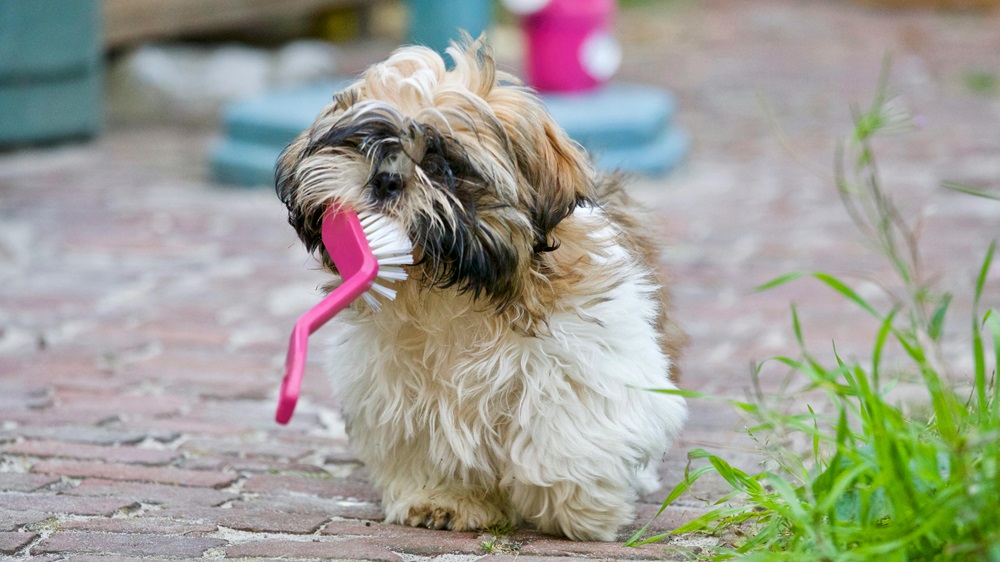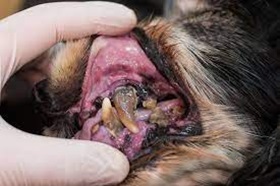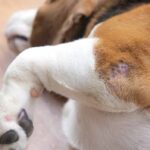
The mouth isn’t the cleanest place to be in any individual. Over time, food and other materials eaten by our companion animals get stuck in between the teeth and leave a buildup on the surface of the teeth that builds up into bacteria-laden plaque.
As time goes on, plaque move under the gums (gingiva) and continues creating irritation and an infection and can lead to early bone loss and gum infection (periodontal disease) and ultimately cause serious dental infections such as abscesses.
Pet owners often overlook the teeth because unless we open their mouths we don’t always see how bad things are. Cats and dogs are also great at hiding pain and have few ways to show the people that their mouths hurt.
18 Signs that your pet could have dental disease

Our pets can’t talk and tell us what’s hurting the. That’s why it’s so important that we watch our animal companions for things like dental disease. There are 18 signs to look out for that could indicate your dog has dental disease, including tooth decay, bad breath, excessive drooling, and bleeding from the mouth.
- Bad breath (halitosis)
- Teeth chattering
- Broken tooth/teeth
- Tooth decay
- Excessive drooling
- Reluctance to eat, especially dry food, or to play with chew toys
- Chewing with or favoring one side of the mouth
- Dropping food
- Pawing at or rubbing the muzzle/mouth
- Bleeding from the mouth
- Loss of symmetry of the muzzle and/or lower jaw
- Swollen/draining tracts under (or in front of) the eye
- Sudden change in behavior (aggressive or withdrawn)
- Chronic eye infections or drainage with no exact cause or cure
- Inability to open or close the mouth
- Chronic sneezing
- Discolored tooth/teeth
- Abnormal discharge from nose
- A mass/growth in the mouth
Treatment for dental disease in dogs and cats
If you see any of these symptoms, take your pet to your veterinarian for a complete oral examination. Your veterinarian may need to sedate or anesthetize your pet, in order to complete the examination. Dental radiographs (X-rays) is often needed to make a proper diagnosis.
Not every veterinarian has the equipment to take dental radiographs. Make sure yours can and has the expertise to treat your pet’s mouth. If he or she can’t, most general practitioners can consult with and make a referral to a veterinarian who has an advanced certification in dentistry.
Recommendations will often include a dental hygiene routine such as daily brushing with a fluoride-free toothpaste, or if your pet won’t tolerate this, there are dental chews such as CET chews or Greenies that can help reduce plaque.
While there are oral additives, this is not as highly suggested. The additive can sink to the bottom of the bowl and its efficacy is also dependent on how much water is drunk. Additionally, some water additives are only stable in water for short periods of time.
Even with daily brushing or appropriate chews as mentioned above, cats and dogs like people still need yearly dental cleanings and oral x-rays. In addition to keeping the teeth and gums healthy, in older pets, these procedures also allow your veterinarian to look at the entire mouth – under the tongue, the tonsillar region, and the cheeks. In older cats and dogs, oral cancer can occur and can be caught early with routine dental cleanings and procedures.
Conclusion
If a dental procedure and oral hygiene is something you haven’t considered before, talk to your veterinarian and see what she or he recommends.
Urban Animal Veterinary Hospital conveniently located in the Heights, has dental x-ray and we incorporate this into our dental procedures. When we find complicated issues below the gum line, we can refer to the type of veterinary dentist mentioned above. Otherwise our well-equipped dental suite lets us diagnose and treat most dental issues including retained baby teeth, fractured teeth, mobile teeth, tooth root infections and more.
If your pet is experiencing one of the symptoms listed above, call Urban Animal Veterinary Hospital in the Heights and make an appointment today.


